


My Hat in My Hands, and My Boots on My Feet
The Crazy Diamond takes on The Tambourine Man
It's rare that a musician creates much of a media buzz without doing something (positive or negative) to attract attention to himself. Yet Syd Barrett manages to do just that--despite the fact that he hasn't recorded in over 25 years, despite the fact that he only really flirted with stardom for a few brief months, and despite the fact that he has made it quite clear that he would just as soon put all that behind him and just be left alone.
All of the above notwithstanding, and despite the fact that few people under the age of 40 have ever heard of him (especially in America), the entertainment press gives him a more-than-decent amount of coverage. 2001 saw the release of a BBC documentary about him, complete with new interviews from friends, family, and former Floyds. 2002 has already seen the release of a VH1 Behind the Music program about him (though, in fairness, this was largely compiled from the same interview footage). Last year's 'best of Pink Floyd' release included a whopping 5 songs by Barrett, and MOJO magazine ran a couple of very nice articles about Barrett in their Pink Floyd cover issue timed to coincide with that album's release (November 2001).
But easily the most exciting Barrett news in the last year--perhaps in the last 10 years--was the release of compilation album entitled Wouldn't You Miss Me. There, nestled amongst the tracks culled from Madcap Laughs and Barrett, was a song called "Bob Dylan's Blues". Fans had known for years that this song existed. There were even rumored lyrics, first published in the 1980s in an Italian book called Where Is The Madcap Called Syd?:
I've got the Bob Dylan Blues
I've got the Bob Dylan Blues
My hair and my hat's in a mess
But I don't give a damn about that!
Recording session logs revealed that the song was recorded on February 27, 1970, along with "Waving My Arms in the Air", "Wolfpack", and "Living Alone". The first two were later re-recorded and released on the Barrett album, while "Living Alone" remains unreleased to this day, and has yet to be liberated by bootleggers. David Gilmour participated in the sessions, and, at the day's end, took the tapes home with him. Recently he told MOJO magazine:
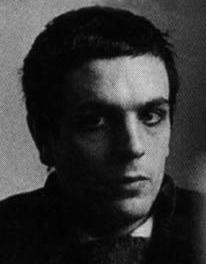 Syd Barrett, circa 1970 |
"Those sessions were done so quickly. We were rushing off to gigs every day and we had to fit the recording sessions in-between. I probably just took it away to have a listen and simply forgot to take it back... Obviously it wasn't intended to be a final mix: Syd knocked it off, I took the tape home."
And there the tapes sat for years, likely in the bottom of some vast box of miscellaneous tapes that Gilmour carted with him from residence to residence as he and Pink Floyd became bigger than Syd had probably ever imagined. Was the song forgotten? Thought lost forever? Or perhaps Gilmour recognized the value of holding on to such juicy tidbits for 30-plus years.
Tim Chacksfield, who helped coordinate the Wouldn't You Miss Me project, said in a press release:"We knew of the song's existence when we put together the Crazy Diamond box set [in 1993] but we had plenty of other material so there was no pressure for us to find it."
"Bob Dylan's Blues" may have been one of the first songs Barrett ever wrote. The story is that Barrett was inspired to write the song in early 1963, after he and Gilmour heard Dylan perform in London. The song then sat untouched in Barrett's notes until he made this recording just seven years later.
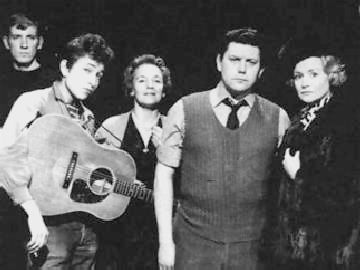 Bob Dylan (with guitar) and the cast of Madhouse on Castle Street, in December 1962 or early January 1963. |
That's the sort of charming fan legend that is wonderful to dream about--boyhood friends and future rock legends going to see another future legend who is just getting started--but that is difficult, if not impossible, to verify. Dylan's first trip to England took place in mid-December 1962, when he filmed a brief singing role in a play called Madhouse on Castle Street for the BBC. He stayed in England for about a month, playing only four London dates--three in December and one in January.
Could Barrett and Gilmour have been at one of these shows? Certainly. Were they? That's a tougher question to answer.
Bob Dylan's Blues (Barrett) |
Bob Dylan's Blues Got the Bob Dylan Blues Gonna write me a song Cos I'm a poet Roam from town to town Make a whole lotta dough Cos I'm a poet So I sings about dreams Well, the guy that digs me Cos I'm a poet |
Barrett's lyrics are sung as though he is Dylan, describing his appearance and his music and so forth, lampooning Dylan's 'talking blues' style. He portrays Dylan as a wealthy-but-slovenly singer more interested in making a buck from his music than anything else. But in describing Dylan as having a 'fat gut', Barrett seems to indicate that he didn't know what he was talking about. Dylan certainly did not have a 'gut' in 1963.
Dylan himself released songs entitled "Bob Dylan's Blues" and "Bob Dylan's Dream" on the Freewheelin' Bob Dylan album in May 1963, presumably after Barrett had seen him and written this tribute. To be fair, Dylan often performed songs before they made it onto record--so either or both of these songs could have been played when Barrett reportedly saw Dylan. And the talking blues style was not unique to Dylan--Barrett would have almost certainly come across it on the old American blues records he loved so much.
One of the most obvious lyrics that seems to give the lie to the rumors of the song's origins is in the chorus:
Cos I'm a poet
Doncha know it
And the wind, you can blow it
This appears to be a parody of lines from Dylan's "I Shall Be Free no. 10" from Another Side of Bob Dylan, released in August 1964:
I'm a poet, and I know it,
Hope I don't blow it
Of course, the jokey kids' rhyme that goes "I'm a poet and didn't know it" may pre-date both songs, and may have been a common source for both songwriters. It may also be relevant that The Freewheelin' Bob Dylan contained a song a very different song called "I Shall Be Free", and that in the last verse of "I Shall Be Free no. 10" he mentions that he picked up a musical phrase "over in England". Perhaps Dylan was trying out the newer version of the song on London audiences at the time. And it is important to point out the very real possibility that Barrett wrote an early version of the song in 1963, and then reworked the lyrics in 1970.
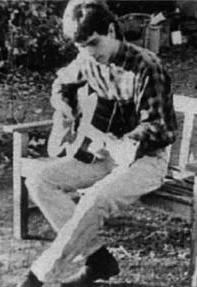 A younger Syd Barrett strums an acoustic guitar, circa 1960. |
That Barrett admired Dylan is hard to dispute. There is ample evidence of Dylan's influence in Barrett's lyrics, both here and elsewhere. Barrett took great liberties with language, developing an inventive stream-of-consciousness style in songs such as "Rats", "Octopus", and the bizarre "Word Song" that rivaled the likes of James Joyce and Dylan himself. Lyrics such as
So I sings about dreams
And I rhymes it with seems
'Cause it seems that my dream always means
That I can prophesy all kinds of things
with its relaxed, imprecise meter and internal rhymes is reminscent of both Dylan's work:
Fourteen, fifteen, sixteen, seventeen, eighteen, nineteen
Gonna knock him clean right out of his spleen
("I Shall Be Free no. 10", Dylan)
as well as Syd's:
In the sad town
Cold iron hands
Clap the party of clowns outside
Rain falls in gray far away
("Baby Lemonade", Barrett)
"Bob Dylan's Blues" is a humorous take on the early Dylan, with his earnest activism running contrary to his increasing star status, at least in Barrett's mind. He pokes fun at Dylan's subject matter, minimizing its weightiness ("Gonna write me a song/about what's right and what's wrong"). He also takes jabs at Dylan's finances, making him out to be just another money-grubbing pop star:
Make a whole lotta dough
But I deserve it, though
and
Well, the guy that digs me
Should try hard to see
That he buys all my discs in a hat.
And when I'm in town go see that.
Somehow, though, all of this manages to come across as a loving tribute rather than a derisive attack. You can't help but hear the smile in Barrett's voice as he imitates Dylan's loose guitar and vocal style. And while Barrett makes no attempts to parody Dylan's characteristically nasal, raspy voice, he certainly borrows a great deal from Dylan in terms of timing and delivery.
David Gilmour tests the solo waters
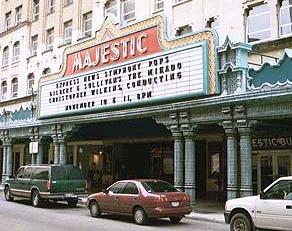 San Antonio's Majestic Theater |
I first saw David Gilmour play live on June 15, 1984 in San Antonio, Texas at a small, beautiful theater called the Majestic. I sat about 3 rows from the man as he delivered the goods with a crack backing band that included Chris Slade and Mick Ralphs.
It's as if he were testing the waters. Well, he sure hooked me. The local radio stations played "All Lovers Are Deranged", and MTV had "Blue Light" in rotation as one of its videos (I wonder if David regrets that "Blue Light" video? Heck, I wonder if half the artists producing videos in that era regret some of theirs!).
Although I like the heaviness of "All Lovers Are Deranged", and the effects that David uses on tunes like "Blue Light", it is the slower, acoustic numbers from About Face that still do it for me. It tends to be overlooked because of the immense popularity of Dave's first solo album, but there is some good stuff on About Face. As a matter of fact, the song "Near The End" may be one of my favorites.
Near the EndAnd when you feel you're near the end
Will you just turn it over and start again
Is there a stirring in your heart
As the time comes when we will have to part?And when you feel you're near the end
And there's a stranger where once was a friend
And you are left without a word
Only the whispers that you've overheardStanding in silence, holding my breath
Disconnected and dry
And though I'm certain that there's nothing left
To hold on to, to give or to try
Some things never change, no don't ever change
And I'm feeling the cold
Thinking that we're getting older and wiser
When we're just getting oldAnd when you feel you're near the end
And what once burned so bright is growing dim
And when you see what's been achieved
Is there a feeling that you've been deceived?
I have always been a fan of Dave's acoustic work. "Near the End" brings me full circle to what I heard from The Wall in tracks such as "Goodbye Blue Sky", or even further back in "Wot's...uh the Deal" from Obscured by Clouds. To me, it was on Meddle that Gilmour really cemented his place as an important creative force rather than just being Syd's replacement, and acoustic tracks such as "A Pillow of Winds" helped him get there.
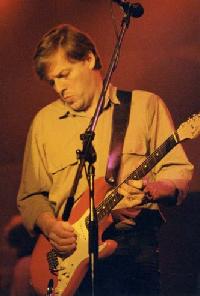 David Gilmour on tour in 1984. |
What strikes me about "Near the End" is not just its obvious nod to David's past but the nod--more importantly at that point--to his future. It is a tune which could have fit on A Momentary Lapse of Reason. The song showcases David's maturity as a songwriter. In Pink Floyd, Roger Waters was the lyric writer. On "Near The End" David steps up to the plate not only by writing the music, but the lyrics too. Put that to a full-blown Bob Ezrin/David Gilmour production and we get as near to perfection as it is going to get.
Dig out About Face and give it a fresh listen. It certainly is ambitious, though it sounds a bit dated. The album gives the listener a chance to hear the artist almost entirely without help from others in the lyric-writing catagory. Yes, it has its flaws, but it does highlight some of the good things that came about when David and Roger parted company.
The title 'About Face' could to be taken in the military sense. But I believe it is about holding your own and persevering. David surely does that on tunes such as "Near the End". He cuts right to the chase with lyrics such as, "thinking that we're getting older and wiser, when we're just getting old". In this vision, David stands out like a colossus among midgets. Perhaps never seeming young in his work is David's unavoidable price for aging gracefully.
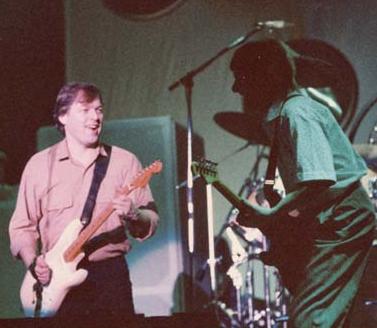 |
A Floyd Fan's Intro to Kelly Joe Phelps
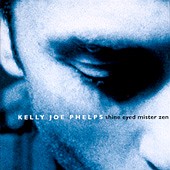 |
Every now and then, there are moments on some records that demand you stop whatever else you are doing and resonate a clear message: "Shut up and listen!" Sometimes the shift is subtle: the blue bass notes and sweet interplay of sax and trumpet on Miles Davis' "Kind of Blue" sneak up on you. Sometimes it's a sonic sound-effect previously unrecorded, much less recorded on purpose: the clanging of clocks that snap your ears to attention on Pink Floyd's "Time" get you every time. But every once in a long while, an album appears that blows you away from the moment the first notes hit the air. The last time this happened to me was when I popped Kelly Joe Phelps' Shine Eyed Mr. Zen in the CD player.
The first song is a "The House Carpenter", an old, traditional acoustic blues tune brought to jaw-dropping intensity by sheer nimble-fingered prowess. Kelly Joe plays two similar yet distinct styles of acoustic blues. He employs the traditional finger-picking method of establishing the basic blues rhythm by thumbing out the lower notes and plucking the melody with his index and forefinger.
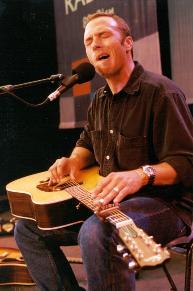 |
But he also plays lap-style slide, and it's this that makes your head spin on this tune. Rather than play with a glass cylinder on his pinkie (as in the style of Kim Simmonds, Johnny Winter, and Eric Clapton), Kelly Joe plays a guitar with an extra thick nut (the piece of white plastic at the top of the fret board). This raises the strings an inch above the frets (and sometimes jams a pencil between the neck and the strings to make them even higher). Sitting in a chair, he lays the guitar across his lap, sometimes using a capo and tuning down the lower strings to the standard open D-chord blues tuning (sometimes lowering the strings as he plays!), and uses a standard metal slide bar to either accent individual notes or get the slide guitarist's trademark crystalline whine.
It's the type of sound you listen to without breathing, for fear that in the five seconds it takes to exhale, you might miss thirty notes. He plays on both sides of the slide bar, banging out chords with a slam across the neck, punctuating his glissandos by thumping on the lower body of his guitar and letting the painful, twisting notes momentarily fade into the dark hollow of the night.
The next cut, "River Rat Jimmy", lends the album its title, with lyrics that describe boyhood friends who become blood brothers: "We wrapped our bloody fingers like a shine-eyed Mr. Zen". Played in the traditional acoustic vein, the song nevertheless transcends the just-another-acoustic-guitar-tune genre through a series of hammer-ons and note-bends that place an emphasis on despair as the story unfolds.
As proud as Kelly must be about his technical astuteness on the guitar (though he always comes across on stage as the least pretentious musician you'll ever meet; no power-chord posturing or air-guitar flamboyance here), I have the feeling the he is even more happy about his vocal prowess. Imagine a Tom Waits before he took up smoking, and throw in the best falsettos of Freddie Mercury. Now put them both in the same song, or even better, in the same verse.
I've seen Kelly Joe play each of these songs at several different shows. He's never played them the same way twice. Within a song he may play the verse and chorus differently each time they come around. He may decide to add a lengthy improvised solo between the third and fourth lines of a stanza. Or he may choose to emphasize the bass notes and higher chords. Simultaneously. He is so far beyond the typical alternating bass line thumbed out in time or the simple finger picking found in many traditional blues guitarists that he sets a new standard by which all future string dazzlers will have to be measured.
The rest of the tracks alternate between country blues and acoustic finger-style tunes. Perhaps "deep blues" might be a more accurate moniker, with titles like "Hobo's Son", "Wandering Away", and "Train Carried My Girl From Town", and lines like "whittle off the hours with a memory for my blade" or "a crooked look lay on his brow / beside a wisecrack whiskey mouth". Kelly sings of loss and despair, of isolation and desolation, and of redemption--sometimes through music, sometimes through prayer. Not through the proselytizing Religion with a capital 'R', but more along the lines of a spiritual fervor that still has it's doubts:
I know you hear my prayer in the morning
I'm not so sure 'bout the answer you gave.
Two other songs deserve special mention. The first, "Capman Boatman", which may or may not be autobiographical ("lay it down horizontal, lean, slip a finger across the bar / whip the high note frantic/ skip the manic songwriters pulled-down rhyme"), contains three passages which are among the fastest acoustic guitar playing ever recorded. Eric Clapton once complained that the reason he didn't care for Eddie Van Halen's playing was that he played too many notes, that you couldn't listen that fast. I've seen Kelly Joe play this tune from the first row, and with a total absence of flamboyance, he plucks off 26 notes in three seconds! The astonishing thing is that while he plays that fast, you can still hear every note. You just can't believe it.
The other song that stands out on Shine-Eyed Mr. Zen is the album's closing track, the traditional Leadbelly tune "Goodnight Irene". Kelly Joe often uses this song to close out his concerts. When his plaintive voice quietly pleads for one more night with Irene, or he "might take morphine and die", one wonders if anything could ease the pain so lovingly expressed through his soulful vocals and mesmerizing guitar.
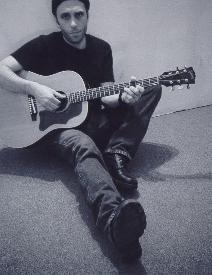 |
I caught up with Kelly Joe after a gig in New Jersey and spoke with him about this article. He chuckled broadly when I talked about comparing his music with Pink Floyd's. "You're kidding, right? I mean, that's about as far apart as you can get." We decided that they do in fact compliment each other. Whereas the Floyd's music is ethereal and spacey, Kelly Joe's is very down-to-earth.
We talked of David Gilmour's slide work on "One of These Days", which relies on feedback and the crunching sustain of electronics to achieve its mood, the most memorable of which occurs when David double and triple pumps before sliding up to the high notes, then slowly retreats back down the scale, pausing briefly on each step. Compare this with the delicate single-note echoes that emanate from Kelly's guitar, notes which seem as tremulous as the thin strands of dew-laden spider webs, shimmering into a silence that leaves the listener drop-jawed and sated. Space and earth.
We spoke about some of the traditional blues musicians that have influenced his music, musicians like Mississippi John Hurt ("fine sense of rhythm"), Rev. Gary Davis ("great writer, great voice"), Pete Seeger ("best American songwriter, period."), then drifted back towards to fairly obscure blues figures--fellows with the last names Anderson and Council.
"Speaking of Floyd", Kelly Joe reminisces before we part, "You know, there was this one album I used to listen to in my early twenties: Animals. It was my favorite record for headphones--especially after getting a good high on, you know, a good smoke high. I'd put the headphones on and those dogs would start barking, "wooo, wooh!" That was something else."
As is Kelly Joe Phelps. If ever there was a soundtrack for these hard times, it resides in the tracks of Shine Eyed Mr. Zen.